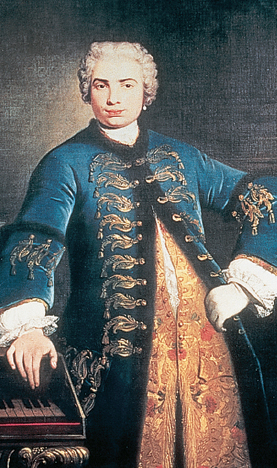THE CASTRATO

Intimately tied up with Italian opera seria was the castrato singer (plural: castrati). The starring male roles in opera were hardly ever sung by tenors or basses but rather by men who had submitted to castration at puberty in order to preserve their voices in the soprano or alto range. At its best, the castrato voice was a prized virtuoso instrument, more powerful and brilliant than a woman’s soprano.
This practice seems an outrage to us today, as it did to everybody outside Italy at the time (and to many in Italy itself). Nevertheless, in Italy and across most of Europe — France was a notable exception — castrati were gladly accepted because of their spectacular singing and given top billing, along with women prima donnas. But the presence of frankly unnatural men in the main opera roles, which were of course usually romantic roles, made it hard to believe in the ideal of opera as serious drama in music. Contributing to the sideshow quality, it was common in opera seria plots for male characters to disguise themselves as women (and vice versa). Then the male soprano voice was used for female impersonation.
The most famous castrati were international stage figures. Some were pampered stars and objects of ridicule at the same time, such as Caffarelli, who was once jailed for indecent gestures during a performance. Others led more dignified careers. Carlo Broschi, whose stage name was Farinelli, the most famous of all, was also a composer and later in life an influential figure at the royal court of Spain.
Most castrati, however, labored far from the limelight, singing in Italian churches. The last known castrato, Alessandro Moreschi, a member of the Sistine Choir in Rome who was born as late as 1858, made recordings in 1902–
You can also rent the 1994 film Farinelli, for which a virtual castrato voice was invented by digital wizardry.